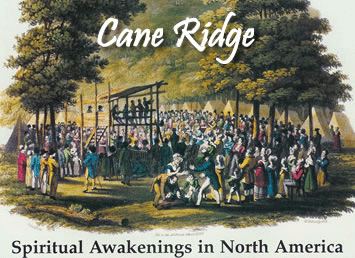
Jim was interviewed in Abilene, TX as one of the 100 most influential men in the history of the Stone-Campbell Restoration Movement from his work with Campus Evangelism.
The first-ever comprehensive reference book about the Stone-Campbell Restoration Movement was debuted at a bicentennial celebration at Cane Ridge, Kentucky.
Dr. Douglas Foster, Abilene Christian University professor of church history and director of the Center for Restoration Studies, was one of three general editors of the Encyclopedia of the Stone-Campbell Movement. You may see the Abeline press release here: Press Release
See also Our Connection with the Campbell-Stone Movement and Reflections on Restoration Forum XXV and the Cane Ridge post in our Blog.

Encyclopedia of the Stone-Campbell Movement
OUR CONNECTION WITH THE CAMPBELL-STONE MOVEMENT
It is important that we begin by saying CSR Ministries is a trans-denominational, Evangelical Christian Movement that works with ALL of God’s children regardless of what church or denomination they are in. A non-denominational stance has been our policy from the beginning of CSR in 1978. We have worked with churches in all five of the major streams of Orthodox Christianity and with many different denominations and churches of all Christian flavors. In addition, a major focus of CSR’s ministry has been with the 45,000 independent, non-denominational churches in the United States. We have worked with Charismatics and with Catholics, Evangelicals and Episcopalians, Baptist and the Brethren, Presbyterians and Pentecostals, Assemblies of God and Anglicans and the list goes on and on.
It is also important to note that both Jim and Anne Bevis come out of the Acapella Churches of Christ, one of the three streams of the Campbell-Stone Movement. The Bevis’ ministered among Churches of Christ for over twenty years before entering the arena of what they call “the big church.” They recognize that their closest kin are in the Campbell-Stone Movement and specifically the Churches of Christ. They rejoice when they learn of the expanding and increasing renewal that is taking place among Churches of Christ as well as the Disciples of Christ and the other stream, the independent Christian Churches.
More than once, Jim has participated in the North American Christian Convention of the independent Christian churches. He had spoken in many independent Christian churches and led Conferences of Spiritual Renewal with the joint sponsorship of independent Christian churches.
In 2001, Jim led the Cane Ridge Prayer Gathering, a three day prayer meeting in conjunction with the 200th Anniversary Celebration of the Cane Ridge Revival of 1801. Jim and Anne worked closely with the Robert Steffans, Curators of Cane Ridge and with Richard Hamm, general minister of the Disciples during that season. Jim participated in a 2004 celebrating at Cane Ridge celebrating the Last Will and Testament of the Springfield Presbytery.
In 2004, Jim and Anne Bevis along with Rex and Elizabeth Vermillion were invited to Abilene Christian University by Dr. Douglas Foster to participating in a living history project of the Churches of Christ. The focus of their four-hour television interview was the Campus Evangelism Movement of the ‘60’s and ‘70’s, led by Jim Bevis, Rex Vermillion and Charles Shelton. It was described by all who participated as a heart-warming experience. The Bevis’ felt it was a “God-appointment” orchestrated by Sovereign God. The Bevis’ feel this is a re-connecting with their roots and they are eager to see where the Lord might lead. If you are interested in viewing the video you can contact Dr. Doug Foster at Abilene or consult the ACU website.
Jim and Anne are available, as the Lord leads, to minister in churches of all denominations and especially in churches of the Campbell-Stone heritage.
REFLECTIONS ON RESTORATION FORUM XXV
Background
Anne and I have just had the opportunity to participate in the final Restoration Forum at Ozark Christian College in Joplin, Missouri. This Forum was established so that Acapella Churches of Christ and independent Christian Churches might get to know one another given their many years of estrangement and separation and, hopefully, move toward healing and reconciliation. Twenty-five meetings have been held.
Never have we struggled so much with a decision regarding our participation in an event as we did with this one. We did not make a final decision to go until the very last minute. We are now convinced that we made the right decision about our participation. We said to each other many times during the three days, “we were supposed to be here.”
Since 2001, God has been doing a new thing with us in re-connecting us with our religious heritage, the Campbell-Stone Restoration Movement. While continuing to minister in the body of Christ at large, it is as if God has had His spotlight on the Campbell-Stone Movement as it related to us and our ministry. To the best of our knowledge, we have done nothing to initiate these stirrings or to “make things happen” although we have sought to respond in obedience to each of His promptings regarding the Campbell-Stone stream. This season began for us with the Cane Ridge Prayer Gathering in August of 2001 which we coordinated. God made it very clear to us that we were to return to Cane Ridge, with a prayer team, to re-dig the wells of revival in prayer. This we did with approximately 120 people of prayer from the three major streams of the Movement. God moved mightily in our midst. We returned to Cane Ridge the following year, and met Dr. Doug Foster of Abilene Christian University. Dr. Foster invited us to come to Abilene and video tape a segment on Campus Evangelism for an oral history project he was working on in the Center for Restoration Studies. We did this. In addition, we were moved to present to Dr. Foster, ACU and the Restoration Center archives all of our personal documents and photographs on the Campus Evangelism project.
In 2006, Anne and I were invited by Milton Jones to participate in the National Campus Ministers Seminar at SMU in Dallas, Texas. Milton indicated that he and the campus ministers wanted to present us with the Stephen Eckstein National Campus Ministry Award and make a statement of apology to us and Campus Evangelism for the part their ancestors had had in CE’s demise. This was a powerful service of reconciliation. We went and again, God showed up!
Earlier this year, we were contacted by Wes Woodell, a campus minister, and invited to speak to the Church of Christ campus ministers who would be gathered together at Harding University in Searcy, Arkansas. Anne and I went. I spoke on “The Campus Evangelism Movement.” We were received warmly and I perceive that the presentation was well-received.
Hopefully, this background information will help in understanding the context of our decision regarding our participation in the Restoration Forum. The few “touch-points” I have described are only a part of some twenty “God encounters” we feel we have had with our heritage over the last six years. All of these were initiated by “someone” other than us.
Observations
1. We were highly encouraged by the spirit of the Forum meetings. The “finger of God” was obviously on this gathering. A bond of friendship and fellowship prevailed in all of the session and love seemed to be flowing between all who were present.
2. We were blessed by the worship, both acapella and with the instrument. It was obvious that the worship had ascending to the throne room to a Father who desires worship from His people. The worship was far beyond what we had envisioned. The anointing of God was present.
3. The preaching from “both sides of the keyboard” was excellent in every respect. It was relevant. It was biblical. It was presented in a way that pointed us to the Father, the Son and the Holy Spirit. It was both honest and loving. Christ, His Church and the Word of God were treated with the pre-eminence they deserve. The importance of relationships was emphasized throughout the event.
4. It seemed that those representing the instrumental churches were greater in number at the Forum than those of the acapella brethren. However, there were a number of key leaders present from each tradition. Also, present and given a place on the program were those from the International Churches of Christ, who have been separated from both groups for the last twenty years. The ICOC grew out of the acapella churches but now use both types of music in worship.
5. Only once did we see what we believed to be the “spirit of sectarianism” raise it’s head. It was addressed by a fellow panelist and it was not allowed to dominate or detour the session. The brother latter said if he could get all churches to be acapella but they did not have love it would be nothing. This statement helped in moderating his previous comment.
6. We felt, from our brief exposure to the Forum, that the instrumental brethren are more ready to “reach across the keyboards” and make more overtures toward reconciliation than the acapella brethren. One of the speakers did mention that he felt that the instrumental churches had been more pro-active in inviting the acapella brethren to participate in their programs than had theacapella brethren. One notable exception to this has been Pepperdine University.
7. Very little was said of any effort that had been made in reaching out to the third major stream of our fractured movement, the Christian Churches (Disciples of Christ).One speaker did mention that it seemed easier to reach out to those who are perceived to be more conservative than to the more liberal groups. Everyone seemed to be in general agreement with this statement. Again, another exception to this would be the Campbell Stone dialogue meetings which are being hostedby the Disciples of Christ.
8. From our perception, it seems that both streams that were present still have difficulty in seeing the Campbell-Stone Movement as only a part of the Body of Christ on earth rather than the totality of the Body. However, it was encouraging to hear an occasional reference to our friends and brethren in the denominations. There seems to be no concerted effort underway to “come to the table” with the rest of Christendom and to begin sharing with those outside the Restoration Movement. We trust and pray that this will come. We do believe the attitudes are slowly changing toward the broader Body of Christ. Our brethren, in most part, have yet to see that God does not save churches, denominations or movements. He saves individuals, wherever they are, who come to Him through Jesus Christ.
Implications
1. For the Bevises. We will continue to minister encouragement and renewal throughout the Body of Christ with a sensitivity to the Campbell-Stone movement, our heritage. We will continue to participate in the meetings of the movement, as He leads, while not neglecting the broader ministry He has given to us.
2. For the Acapella Churches and Independent Christian Churches. The healing process has begun but is far from over. The Restoration Forums in their present configuration are over. Additional opportunities will be needed for continued dialogue, fellowship and even cooperative ministry. We believe that will come.
It is becoming increasingly obvious to us that God has not given up on the Churches of Christ or the Campbell-Stone Movement. Neither have we!


